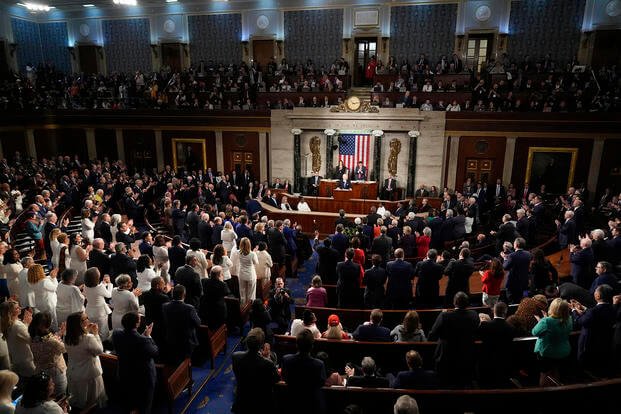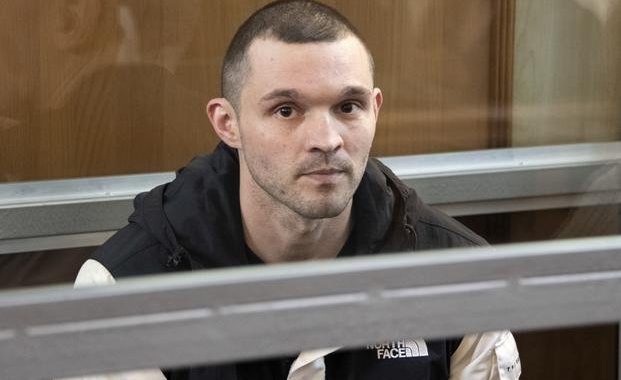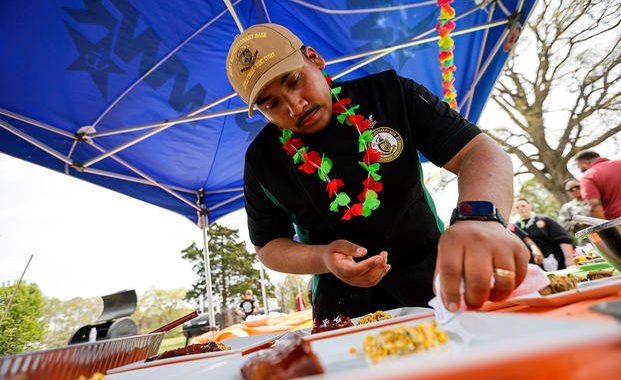100 Veterans Will Serve in Congress at the Start of Next Year
4 min read

Eighty-seven of the 189 Republican and Democratic veterans who ran for Congress this year won their elections, meaning the start of the next congressional session will have more veterans serving than in nearly a decade.
Combined with the 13 veterans in the Senate who were not up for reelection this cycle, the winners this year will bring the number of veterans in Congress to 100 at the beginning of next year.
The results of this year’s election point to a slow but steady growth in veterans in Congress. That should continue in the coming years because post-9/11 veterans are aging into Congress and are reversing the trend set by Vietnam veterans of those with military experience eschewing runs for office, said Seth Lynn, a Marine Corps veteran and executive director of the Veterans Campaign, which trains veterans on how to run political campaigns.
If you look at the trends over time, what we’re starting to see is that the freshman class of Congress is tending to have a higher proportion of veterans in it than the House overall,” Lynn said.
Next year’s number of veterans in Congress will quickly drop to 98 when Vice President-elect JD Vance and Rep. Mike Waltz, R-Fla., who has been tapped to be the Trump administration’s national security adviser, leave after President-elect Donald Trump is sworn in Jan. 20. But that’s still a tick ahead of the 97 veterans who started off this congressional session in 2023, and the highest number of veterans in Congress since 2017, when 102 served at the start of the session.
The number of veterans who will be in Congress next year was solidified last week when The Associated Press called the final two races involving veterans weeks after the November election because of slow counting in one race and a recount in the other. One House race in California remained uncalled as of Monday morning, but that race does not involve a veteran.
In the two nail-biter races called last week, Army veteran Derek Tran, a Democrat, defeated incumbent GOP Rep. Michelle Steel for a California House seat by less than 600 votes, while Rep. Mariannette Miller-Meeks, R-Iowa, a former Army doctor, held onto her seat against a Democratic challenger by less than 800 votes.
Miller-Meeks will be one of nine woman veterans serving in Congress next year, the highest number of female veterans in Congress ever. The women will include two fresh faces: Maggie Goodlander, D-N.H., a Navy Reserve veteran who is married to National Security Adviser Jake Sullivan, and Sheri Biggs, R-S.C., a Republican Air National Guardlieutenant colonel.
The veterans who won their races include 21 Democrats and 66 Republicans, meaning there will be 26 Democratic veterans and 72 Republican veterans overall at the start of the next Congress.
Veterans in some marquee races this election cycle were able to knock off longtime incumbents, including GOP Navy veteran Tim Sheehy in Montana and GOP Army veteran David McCormick in Pennsylvania both winning Senate seats. In other cases, though, being a veteran was not enough to push a challenger over the edge, as with GOP Army veteran Sam Brown losing to Sen. Jacky Rosen, D-Nev.
These days, party affiliation is more important to the outcome than veteran status, Lynn said.
“This election, a lot of veteran candidates punched a bit above their weight class,” he said. “Some of it was just a lot of them were Republicans, and Republicans tended to do better. Even the ones who lost, like Sam Brown in Nevada, Republicans did much better there than was expected.”
But one of the most surprising races this year involved independent candidate Dan Osborn, a Navy and Army National Guard vet. He ultimately lost to Republican Sen. Deb Fischer in Nebraska’s Senate race by about 7 points, but gave Fischer a much more competitive race than expected.
Osborn and some other veterans who ran for office this year got a boost from an organization called Independent Veterans of America that recruits and supports former service members who want to run as independents.
Osborn “is the sign of the potential of what we could see over the next couple of decades,” IVA founder Paul Rieckhoff said. “He brought people together of all different parties and especially the people of no party at all, which is 51% of the country right now.”
IVA, which launched in July, donated “more than six figures” to Osborn’s campaign through its political action committee. Rieckhoff said he was pleased with the outcome even though he wished Osborn had won.
“I think Dan could have won, but we were really outgunned,” Rieckhoff said. “He still did really well, and he’s shown if a candidate can do that, they can compete.”





